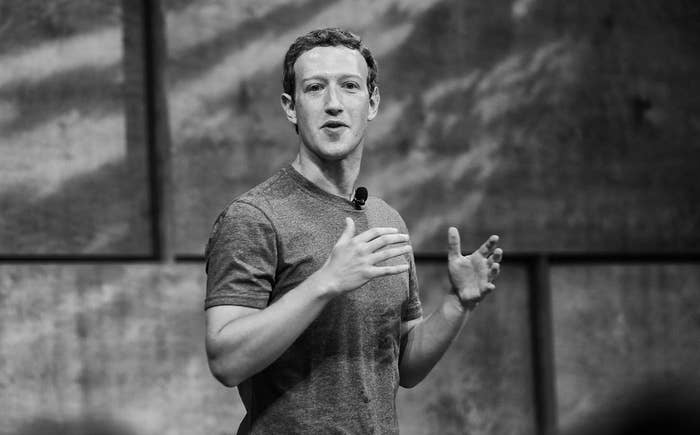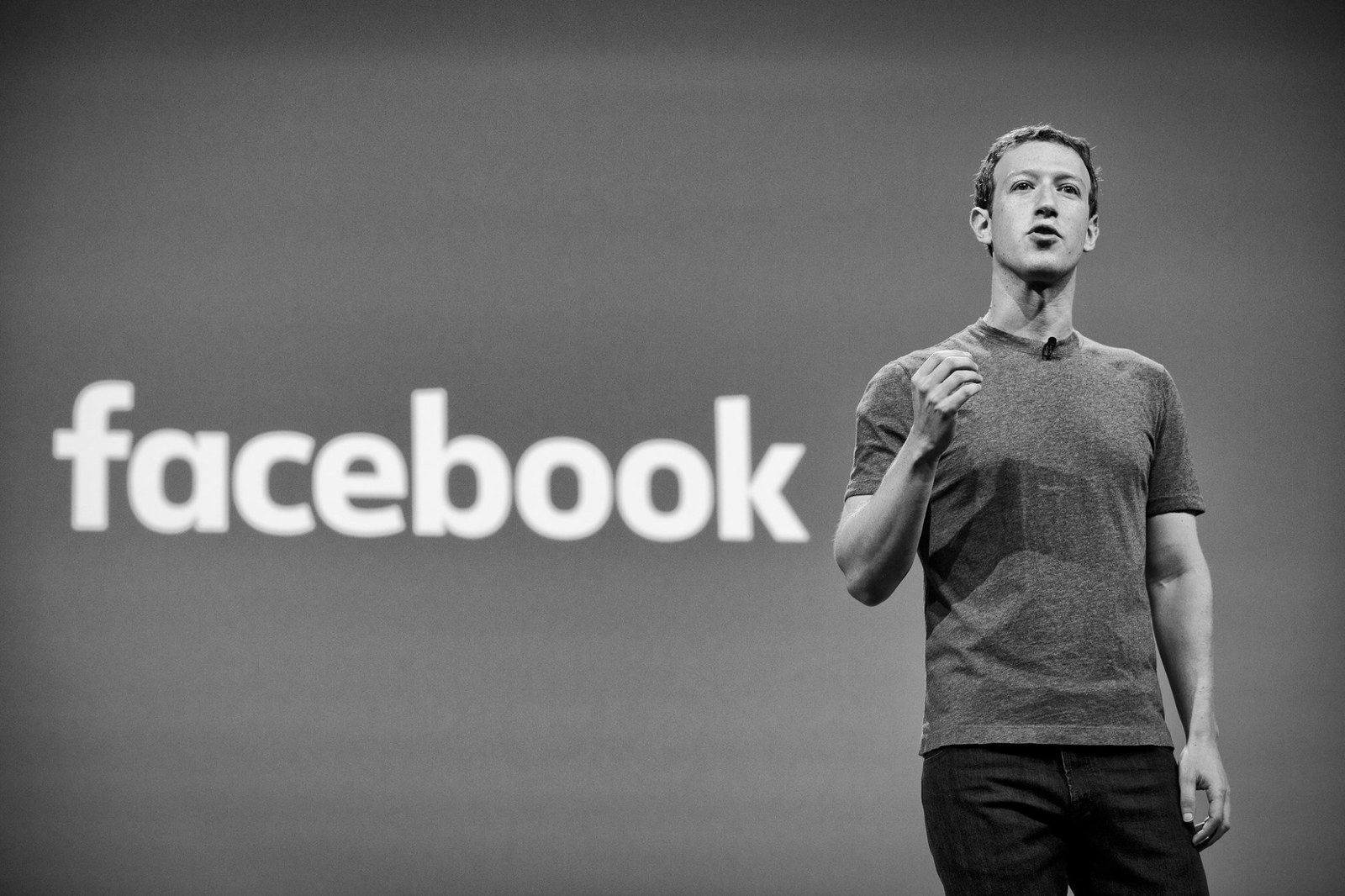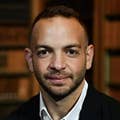
The thing about Mark Zuckerberg in person that doesn’t always come across online is that he is one intense human being. He speaks forcefully, with a grammarian’s enunciation; rarely blinks; and has the posture of a palace soldier. This intensity is especially on display when he’s fired up — when he leans in with that rigid spine and his hazel eyes engorge — as he was on Tuesday afternoon at Facebook’s headquarters in Menlo Park, California, describing the more interventionist direction he’s heading in with Facebook, and, by extension, its 1.86 billion users scattered across the planet.
“Everyone who cares about that idea of connecting the world will need to play a bigger role and take some responsibility for making sure that the global community works for everyone,” the Facebook CEO said, in a fishbowl-like (or, depending on your viewpoint, panopticon-esque) conference room on Facebook's campus. “Without that, it is no longer a given that the world will move in this direction on the time horizon that we once thought it would.”
For years, Facebook has pursued the mission of making the world more open and connected in a largely value-neutral way. It has long maintained that it is simply a technology platform that gives people what they ask for, with some community guidelines and a News Feed tweak for quality here and there. But in a sweeping and remarkable letter, published Thursday, and in an interview with BuzzFeed News, Zuckerberg signaled that he intends to more actively use his platform’s power to intervene in people’s lives in real ways — whether by merely introducing them to new ideas or by taking concrete actions to prevent people from harming themselves or others. Simply put, Facebook is embracing humanistic values and incorporating them in its broader technological mission to connect the world.
Some of what's in Zuckerberg's letter will be viewed as too far-reaching, invasive, or even creepy. Some of it will be viewed as naive, or at the very least met with skepticism. But both in the letter and in person, Zuckerberg makes clear that he intends to exercise the influence and scale of Facebook's massive platform in ways that will reach far beyond the digital world.
Among the efforts he’s pushing: mitigating polarization by presenting a spectrum of viewpoints and down-ranking sensationalized news; fighting bullying; preventing people from harming themselves or others by creating systems to pick out signs of intent among users to harm themselves or others; building AI that can detect terrorist recruitment; and building “the long-term social infrastructure to bring humanity together” in a world increasingly questioning the merits of globalization. Much of the letter focuses on Zuckerberg’s beliefs about where Facebook should go, as opposed to announcing market-ready products.
The outcome of the 2016 US presidential election — which was deeply influenced by anti-globalization impulses, along with Brexit, and a growing tide of nationalism across the world — seemed to factor especially heavily for Zuckerberg. It’s worth noting that when asked if he was explicitly rejecting nationalism and nativism in favor of globalism, Zuckerberg demurred, noting that “often these things are pitted as opposites in a way I don't think is true.” But he then went on to argue that the problems he’s trying to address are bigger than any one nation can solve alone.
“A lot of the biggest opportunities,” he said, “whether it's making sure that everyone around the world has freedom and prosperity or we can eradicate all these diseases or lift people out of poverty ... All those opportunities, and also a lot of the big challenges — like fighting climate change or the fact that a civil war in one country leads to a refugee crisis across continents — these are not only national problems, they're global problems. I do feel like there's this sense that we don't have all the right infrastructure for dealing with that today. That's a thing that needs to get built.”
This embrace of globalism is best viewed as part of an evolutionary journey for the company. Its mission to connect the world via Internet.org was cast (perhaps mistakenly) in largely altruistic global terms. At the company’s F8 developer conference last year, Zuckerberg delivered remarks that were widely interpreted as a repudiation of Trumpism and the growing nativist sentiment in countries across the world, saying, “I hear fearful voices calling for building walls and distancing people they label as 'others.'”
What seems evident is that Zuckerberg perceives threats to globalism and wants to use the power of Facebook's platform to help bring about systemic international changes.
Fighting Fake News and Sensationalism
Zuckerberg also seems to have come to terms with the role Facebook plays in sowing misinformation, a favorite tool of those seeking to sow division. After he initially labeled the notion that fake news influenced the US presidential election as “pretty crazy,” Facebook enlisted the help of fact-checkers to help moderate its influence. Similarly, after long playing down his company's role in the media ecosystem, in recent months Zuckerberg has noted that it’s “not a traditional technology company” when asked about its influence on the way people access media.
In his letter, Zuckerberg identified creating an “informed community” as a key goal, rueing the misinformation and sensationalism that have led to polarization and a “loss of common understanding,” which he believes is necessary to make progress.
To fix these issues, Zuckerberg offered a few suggestions, including reducing the reach of sensationalist stories. He also pointed to a possible approach that would “show a range of perspectives, let us see where our views are on a spectrum and come to a conclusion on what we think is right.”
Zuckerberg believes that Facebook should deliver people what they want to see, but this has become complicated in the era of fake news. Still, Zuckerberg argued that people ultimately want good, accurate stories. "I don't think anyone has ever told us that they want to see something even if it's untrue.”
“There is this question now, especially in the last year, of whether having that diversity of ideas fragments our shared sense of reality,” he said. “Any community needs two things in order to be able to move forward and make progress: You need a way to inject new ideas for how to make progress — otherwise you're just stagnant — and you need a way for people to have enough common understanding, so that way you can actually move forward together. There are a lot of things that can erode common understanding. Misinformation is one. Sensationalism is another — if people are just playing up one part of the truth that contributes to a lack of understanding and polarization.”
“There is this question now, especially in the last year, of whether having that diversity of ideas fragments our shared sense of reality." —Mark Zuckerberg
But though Facebook’s users may not ask for misinformation or sensationalism, there are certainly indications that they enjoy it. Pizzagates and stories of that nature can be like candy: enjoyable in the moment, ultimately not good for you, and really hard to turn down. Taking that candy away is a bold move, and Zuckerberg appears to be aware of the importance of doing it cautiously.
"I do think we need to be really careful about this,” he said. "On misinformation, the basic premise that we're going for is we're not trying to ban things that people think might be misinformation. We're generally trying to help surface other signals, so that way people can evaluate these things for themselves."
Fight Crime, Prevent Harm
Another major theme in Zuckerberg’s letter, and perhaps the one that will be most controversial, was a commitment to use Facebook’s power to prevent people from hurting themselves and others. Working on this issue seems personal for Zuckerberg, who became upset discussing a recent incident on the platform. “A few weeks ago, a girl livestreamed killing herself,” he said. “It's hard to be running this company and feel like, okay, well, we didn't do anything because no one reported it to us.”

Instead of waiting for reports of this nature, as Facebook has in the past, Zuckerberg suggested a more proactive approach, aided by AI, that doesn’t require user flagging. “Looking ahead, one of our greatest opportunities to keep people safe is building artificial intelligence to understand more quickly and accurately what is happening across our community,” he wrote in the letter.
Given its sheer scale, Facebook could perhaps save many lives by becoming more actively interventionist. Asked to describe Facebook’s philosophy on when it should intervene, Zuckerberg said that in many cases, "the question is ‘What is possible?’” When Facebook’s technology reaches a point where it can detect warning signs of self-harm or signals of bullying, it will “unlock a lot of value and also create a lot of questions about how and where you want to use that,” Zuckerberg explained. “Some of these cases around saving people's lives are probably going to the the first ones that you want to use it.”
As Facebook knows well, you don’t monitor people’s private conversations and posts without facing valid questions about user privacy. In his letter, Zuckerberg opens himself up to such questions, even wading into Minority Report territory. He describes, for instance, goals of identifying crime risks and using AI to identify “quickly remove anyone trying to use our services to recruit for a terrorist organization."
Asked about the balance between safety and privacy, Zuckerberg said he believes it’s not zero-sum. “You can have two goals on things, even if they're a little bit in conflict, and make progress on both,” he explained. Using metadata alone, for instance, Facebook was able to identify spammers on WhatsApp without reading the content of the messages themselves. “In general, we'll create a lot of value for a lot of people by running in both directions at the same time and not always getting held up by where they might be in conflict, because a lot of the time they're not.”
Takedown Transparency
Zuckerberg also indicated that changes are on the way for the company’s content takedown procedures, expressing dismay over the current protocol, which has led to the removal of critical political speech. “In the last year, the complexity of the issues we've seen has outstripped our existing processes for governing the community,” he wrote in the letter. “We saw this in errors taking down newsworthy videos related to Black Lives Matter and police violence, and in removing the historical Terror of War photo from Vietnam.”
Though he noted that it’s not a wholly formed plan yet, Zuckerberg indicated that Facebook could turn over the concept of community standards to the users of his platform. “The idea is to give everyone in the community options for how they would like to set the content policy for themselves,” he said. “Where is your line on nudity? On violence? On graphic content? On profanity? What you decide will be your personal settings.”
Until then, Facebook could be well-served to explain why content comes down when it comes down. To date, the company has relied on a few vague excuses to explain the removal of politically significant content, including “glitch,” “technical issues,” and “error.” Asked if he thought the world would benefit from hearing in a more transparent fashion why Facebook makes decisions to take down certain content, Zuckerberg replied, “Yeah,” and then paused for effect. “There's a lot of things that we need to get better on in this [area].”
Throughout the course of a 35-minute discussion with Zuckerberg, the concept of Facebook’s power came up again and again. And each time, Zuckerberg was quick to temper the descriptions of what Facebook is capable of, explaining, for instance, that “we're a pretty small part of the overall media,” or “the reason why we succeed is because we're empowering other people."
Facebook is only 13 years old, and in that time it’s transformed from a dorm room project into one of the most influential social forces on the planet. In this context, it makes sense that the company is still working to find the right way to think about what its power means and when it should use it. But with Zuckerberg’s letter, the company is at last contextualizing it and, perhaps more significantly, setting out to wield it more broadly.
Outside Your Bubble is a BuzzFeed News effort to bring you a diversity of thought and opinion from around the internet. If you don't see your viewpoint represented, contact the curator at bubble@buzzfeed.com. Click here for more on Outside Your Bubble.

